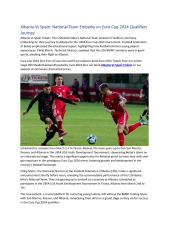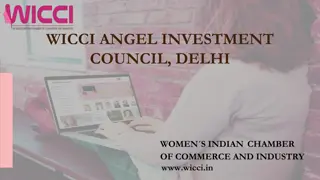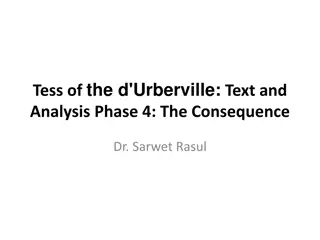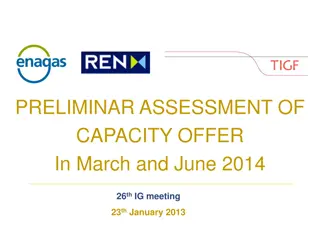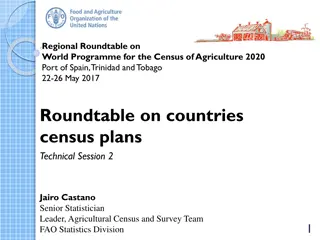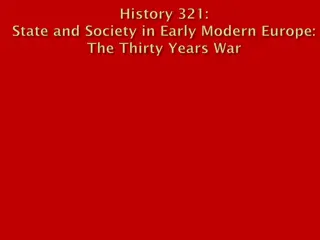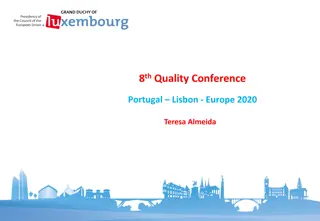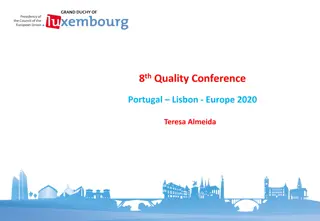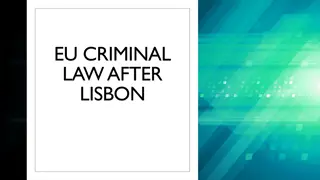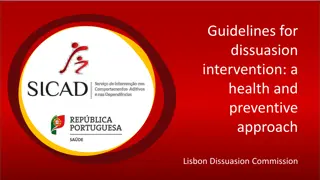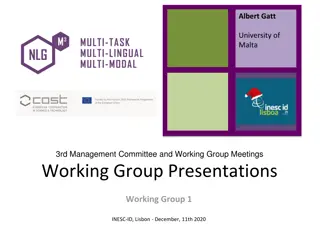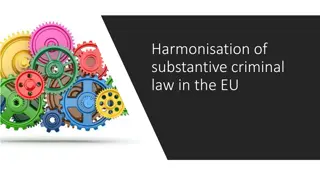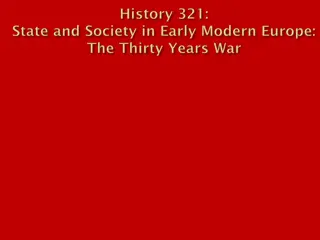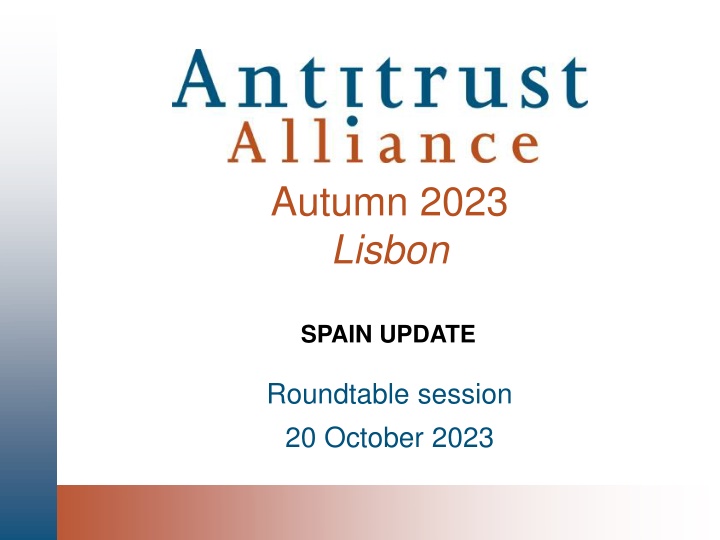
Legislative Developments and CJEU Case Law Update in Spain - Autumn Roundtable 2023
Stay informed about the latest legislative developments in Spain, including amendments to the Defense of Competition Law and significant CJEU case law impacting Barcelona City Council's regulations on VTC services. Explore changes in team members, new transaction procedures, and guidelines for competition law infringements. Enhance your understanding of the legal landscape surrounding competition and business practices.
Download Presentation

Please find below an Image/Link to download the presentation.
The content on the website is provided AS IS for your information and personal use only. It may not be sold, licensed, or shared on other websites without obtaining consent from the author. If you encounter any issues during the download, it is possible that the publisher has removed the file from their server.
You are allowed to download the files provided on this website for personal or commercial use, subject to the condition that they are used lawfully. All files are the property of their respective owners.
The content on the website is provided AS IS for your information and personal use only. It may not be sold, licensed, or shared on other websites without obtaining consent from the author.
E N D
Presentation Transcript
Autumn 2023 Lisbon SPAIN UPDATE Roundtable session 20 October 2023
A. Changes in team members and important legislative developments No changes in the team. (1) Amendments of Spanish Law 15/2007, of July 3, on the Defense of Competition. Sanctioning procedures: the period for formulating allegations to the statement of facts and the proposed resolution has been increased from 15 days to one (1) month. Likewise, the maximum period for resolving the file has been increased from 18 to 24 months, counting from the initiation. Concentration control: in the case of operations notified with an abbreviated form, a maximum resolution period of 15 days is established, provided that a confidential draft of the notification form has been provided to the CNMC. The maximum period to resolve concentration operations in the first phase continues to be one (1) month from the receipt of a complete notification, the maximum period to issue a resolution in the second phase has been increased from two (2) to three (3 ) months from the agreement to open the second phase. In prior consultations on concentration operations, a period of one (1) month is established from receipt of the consultation form. New transaction procedure (settlement): Under this procedure, the investigated companies receive a reduction in the fine (in the case of the European Commission, 10% is granted; in the LDC reform it could be up to 10% or up to 15%, depending on the circumstances), in exchange for accepting responsibility for the facts investigated. Fine for natural persons with representation positions or directors of the offending companies that have intervened in the conduct is increased from: 60,000 euros to 400,000 euros. (2) The CNMC publishes guidelines to facilitate quantification of damages in private actions for competition law infringements claimed by parties affected before the Courts. This Guide is directed to judges, lawyers, experts and consumers participating in damages actions. Parties affected by these conducts can claim compensation from the infringers before the courts. The guidelines facilitate the determination of the amount and kind of damages, which can be a complex exercise. The document includes best practices to improve the quality of expert reports. 2 2
B. Relevant case law with EU importance The CJEU concludes that the restrictive regulations of Barcelona City Council in relation to CABIFY restrict the freedom of establishment On June 8, 2023, the CJEU responded to the preliminary rulling raised by the Superior Court of Justice of Catalonia ("TSJC") in the framework of the litigation between the owner of CABIFY, operator of Tourist Vehicles with Driver ( VTC ), and the Barcelona Metropolitan Area ( AMB ). Background: After the elimination of the ratio of 1 VTC / 30 taxis in 2009, there was a significant increase in the number of VTC licenses. As s consequence the AMB decided to approve a new regulation that alleged reasons of general interest and the need to protect the taxi sector. This new regulation required (i) the need to obtain an additional specific license to carry out VTC services activity in the AMB; and (ii) re-established the ratio of 1 VTC license for every 30 taxi licenses granted. The CJEU rejects the argument relating to the reasons of general interest of the AMB (Barcelona City Council). According to the CJEU, economic objectives such as ensuring the economic viability of taxi services cannot constitute a reason of general interest that justifies a restriction of a fundamental freedom guaranteed by the Treaty. The Court points out that: "at no time has it been proven by the AMB that the restriction of the issuance of licenses to a proportion of 1 for every 30 taxi licenses is adequate to achieve the management of local transportation, local traffic, use of public space and protection of the environment". 3
C. Cases handled by the team (1) Advising Spanish Reciprocal Guarantee Society (audiovisual and gambling sectors) SGR in Spain; Socama in France, SCM in Belgium, Confidi in Italy or SPGM and SCM in Portugal are similar kind of initiatives of entrepreneurs, local, regional and State public administrations, chambers of commerce and/or institutions specializing in SMEs in the sector of financial services. They allow SMEs access to external financial means. These systems also allow the risk to be shared with the credit issuers and allow access to the credit of the SMEs in better financial conditions regarding term and cost. In Spain there are 17 SGR (regional or sectoral) We are advising the only Spanish SCR specialized in the audiovisual sector and the gaming sector, because the CNMC has just started a procedure analyzing whether this type of subsidies that public administrations grant to the SCRs could be considered state aid, since they grant economic advantages to two different types of operators: to the SCRs, as intermediary operators of the guarantees, and to SMEs, as final beneficiaries of these subsidies. gambling regulations. Although the regulations do not prohibit granting direct aid to an entity, such as SCRs, the CNMC recommends introducing a competitive bidding procedure that allocates public funds more efficiently. 4
C. Cases handled by the team (2) Sveza Verkhnyaya Sinyachikha and others / Commission. (Case T-2/22) (2022/C 84/66) We are advising an important Spanish birch plywood manufacturing company in the context of an anti-dumping procedure initiated by the European Commission against 6 companies importing birch plywood originating from Russia into the EU. 5
D. Publications and other The imposition or maintenance of resale prices in Spain after the approval of the new EU Regulation on vertical agreements . Author: ngel Vald s. To be published in the Aranzadi-Civitas Competition Law Yearbook 2023. (Thomson Reuters Group) Seminar on Competition Dawn Raids within the EU. Speaker: ngel Vald s Competition Law Masters program of the Universidad Carlos III. Madrid, September 2023. Seminar on Competition Law in the Pharmaceutical Sector. Speaker: ngel Vald s To be held at CEFI (Foundation of the main innovative pharmaceutical companies in Spain) in Madrid, October 2023. [ ] 6


